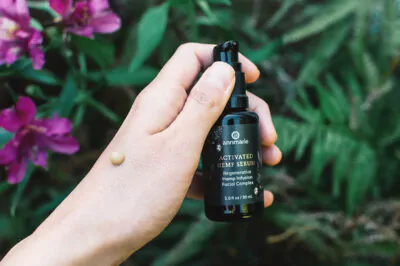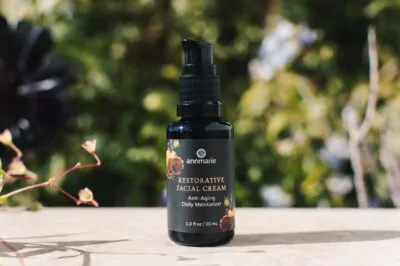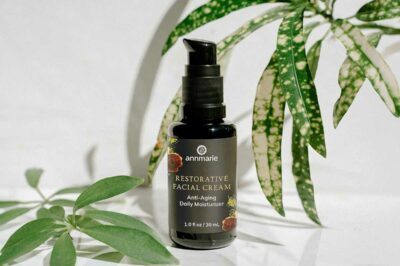Table of Contents[Hide][Show]
Using natural, anti-aging skin care is one of the things you should be doing in order to reduce the appearance of fine lines and wrinkles. Moisturizing, hydrating, and feeding your skin with antioxidants is important.
But it’s not the only thing you should be doing.
If you’re someone who wants to delay wrinkles for as long as possible (and who doesn’t?), there are some simple (and some not-so-simple) things you can do. It’s all in your habits:
7 habits to reduce the appearance of wrinkles naturally
Your super-powered anti-aging concoction can’t save you if you’re not doing these things:
1. Don’t forget the basics
You know the basic recommendations—protect yourself from the sun with clothes and sunscreen (zinc oxide is best), don’t smoke, don’t drink too much, and don’t go to bed with your makeup on. Doing these things on a regular basis is doing the very minimum for wrinkle reduction.

2. Get enough sleep
You may have heard this before, but new research shows even more plainly how important a good night’s sleep is to the appearance of your skin.
The science behind sleep and skin
In a 2015 study, for example, researchers observed 60 women—some categorized as poor sleepers, and some as good quality sleepers—and evaluated their skin with a variety of photos, sun exposure tests, and laboratory tests. They then added up the “scores” from each of these tests to come up with an overall “skin aging” score, which included measurements of wrinkles, fine lines, reduced elasticity, uneven pigmentation, and sagging. Women with a higher score had an older appearance.
Results showed that good sleepers had an average score of 2.2, while poor sleepers had an average score of 4.4 (which meant skin looked older). In addition, after five nights of poor sleep, participants had up to double the amount of fine lines and wrinkles, and up to three-quarters more brown spots!
the real effects of getting good sleep
“Our study is the first to conclusively demonstrate that inadequate sleep is correlated with reduced skin health and accelerates skin aging,” said Dr. Baron, Director of the Skin Study Center at UH Case Medical Center and Associate Professor of Dermatology at Case Western Reserve University School of Medicine. “Sleep deprived women show signs of premature skin aging and a decrease in their skin’s ability to recover after sun exposure.”
Another tip—if you get a bad night’s sleep, “catching up” with a nap the next day won’t help your skin. Shoot for 7-9 hours every night!
3. Speaking of sleeping—do it on your back if you can
There is some evidence that sleeping facedown in your pillow, or face-sideways in the pillow, over a period of many years, can cause wrinkling of the skin.
In 2004, for example, researchers reported that lines in the same area of the face were caused by the sleeping position. They called them “sleep lines,” and stated that “sleeping position should be considered as an aetiological factor in the formation of wrinkles.”
How does this work?
It seems that while you’re asleep, the pillow can tug at your skin, eventually reducing elasticity and allowing the skin to sag into lines. Luckily, sleeping on your back is also thought to be the healthiest way to sleep, so if you can start sleeping on your back, you’ll be healthier as well as preventing wrinkles.
You could also look into special kinds of pillows that are designed to prevent pillow-induced wrinkles.

4. Boost collagen naturally
Collagen is that protein in your skin that gives it strength and structure. It’s the breakdown of collagen later in life that leads to sagging and wrinkles.
Good news is that you can also boost collagen naturally with your diet. The best options for collagen-producing agents include bone broth (one of the best), dark green veggies, meat (make sure it’s organic and well-sourced,) egg whites, beans, and cheese.
It’s also important to get enough vitamin C internally—found in citrus fruits, broccoli, and bell peppers.
5. Eat more omega-3 fatty acids
Adding more foods rich in omega-3 fatty acids to your diet—including fatty fish, walnuts, flaxseed, olive oil, and chia seeds—helps the skin hold onto moisture, which can reduce the appearance of wrinkles. These nutrients also can help to keep your skin feeling calm and smooth.
These nutrients are so important that studies have found that when they’re lacking, the skin reacts by becoming dry, scaly, and even developing problems.

6. Get more vitamin C
Getting more vitamin C in your diet may help you reduce the appearance of wrinkles. A 2007 study of over 4,000 women, for example, found that those who had higher intakes of vitamin C had lower levels of wrinkles and dryness.
At the same time, those with higher intakes of carbs and fat were more likely to have wrinkles, so following a healthy diet is also a good idea for keeping skin smooth and young-looking.
Top sources of vitamin C include citrus fruits, peppers, guava fruits, dark green leafy veggies (especially kale), kiwi, broccoli, and berries.
7. Work stress relief into your daily routine
Stress is horrible for your skin. You’ve probably experienced the effects already, but now we have studies showing that the skin and the rest of the body are definitely linked when it comes to stress.
In 2015, for example, researchers examined skin in 5,000 participants. Compared to those experiencing low stress, those suffering from high stress had significantly more itchy skin, scaly skin, and rashes.
The link between stress and skin
In an earlier 2014 study, researchers looked for a link between stress and skin problems. They noted that previous research had linked changes in the nervous system to psoriasis flare-ups, and stress to inflammatory skin conditions. Animal studies have also found that stressed participants developed skin cancers more quickly than those not exposed to stress.
Stress wreaks havoc on the body
“Recent research has confirmed skin both as an immediate stress perceiver and as a target of stress responses,” researchers wrote.
In fact, stress causes the skin to release hormones that encourage inflammation, and also irritates the nerves (which can lead to allergic reactions), disrupts barrier function (which can dry skin and increase risk of wrinkles), decreases the production of moisturizing lipids, and slows wound healing.
Want to avoid wrinkles? Work stress-relief into your daily routine. Try yoga, meditation, daily walks, journaling, art therapy, time with loved ones—whatever works for you.
Do you have any tips for reducing wrinkles naturally? Let us know in the comments below!








Great article!! Thank you…I didn’t know allot of these things!!!
Drink a lot of water!
All these things work, but sometimes wrinkles are just too stubborn. I tried laser treatment for my wrinkles and was really happy with the results. Now, of course, I will be more meticulous about following the advice above so I don’t get too many more new ones.
Thanks for sharing this tips. I really like the ways that you said, this all might be done if we really want to stay young and wrinkle-free. Now I was thinking that I should also write an article, concerning how we can lessen wrinkles
Sunscreen can help to avoid wrinkles on your face. Thanks for sharing your tips to us.
I am a side sleeper, and hard as I try just cannot sleep on my back. However, using a silk pillow case has helped tremendously to prevent getting sleep wrinkles. Some say silk pillow cases are easier on your hair as well!
Thank you for all your amazing products, and your informative blog!!
love your website